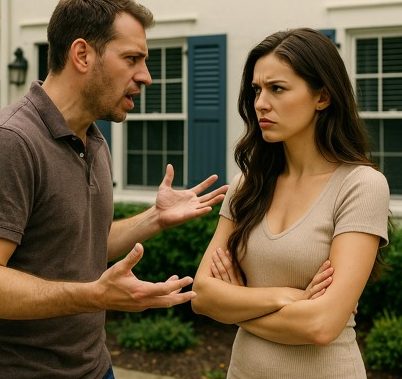Róbert’s foot slammed the brake so hard the car jolted forward before shuddering to a stop.
Mária didn’t move. She sat in the passenger seat, hands folded in her lap, eyes locked on the house ahead—no longer the crumbling ruin he expected, but a vibrant, living thing. Whitewashed walls. Blue shutters. A garden alive with dahlias and lavender.
Róbert leaned forward.
“What the hell is this?”
Mária opened the car door without a word and stepped out. He followed, jaw tight, eyes narrowed. A soft wind rustled through the trees as they walked up the gravel path. The old wooden door opened before they reached it.
Madame Lefèvre stood there, dressed in crisp linen, a clipboard in hand.
“Ah! Bonjour, Mária,” she smiled. Then her gaze slid to Róbert and cooled by several degrees. “Is this the husband?”
“I’m not ‘the husband,’ I’m the owner’s—” he started, but Lefèvre raised a brow.
“No, monsieur. You are not the owner of this property.”
Mária said nothing.
Róbert turned to her, confusion turning to suspicion.
“What’s going on?”
“I restored it,” Mária said calmly. “I brought it back. It’s in my name. And today…” She turned to Lefèvre. “…the listing goes live.”
Lefèvre nodded. “I have three viewings scheduled already.”
“You’re selling it?!” Róbert exploded. “Without me?”
“It was never yours,” Mária replied. “Legally or otherwise.”
He laughed, cruel and sharp.
“Oh, please. You think a couple of flowers and painted shutters make you independent? I made you.”
“No,” she said. “You kept me small. But you didn’t make me. And you don’t own me.”
His face contorted. He stepped forward.
“You think you’re clever now? Think you’re strong? This is my retirement we’re talking about. You’ll regret this—”
“No, Róbert,” came a new voice. Male. Steady. “You’ll regret this.”
A tall man stepped out from behind the hedges, wearing dark slacks and a collared shirt. He carried a messenger bag slung across his chest and wore an expression of quiet resolve.
Róbert blinked.
“Who the hell are you?”
“Mária’s advocate. And her legal counsel,” he said. “I’m here on behalf of the Ministry of Heritage. This property has been approved for historic designation. You cannot force a sale, nor claim any stake. In fact,” he added, retrieving a folded document from his bag, “you may want to read this.”
He handed it to Róbert.
Róbert didn’t take it.
“What is this, some scheme? You tricked her into—”
“She didn’t need to be tricked,” the lawyer said coolly. “She needed to be heard. And this—” he tapped the document, “—is a restraining order. You’re not to approach this property, or Mária, again.”
Róbert’s face blanched.
“That’s ridiculous.”
“No,” Mária said. “What was ridiculous was thinking I’d stay silent forever.”
He turned to her then, eyes pleading, shifting tactics.
“Come on, Mária. Don’t do this. Think about all we’ve built.”
“I have. And all I found were chains.”
A long silence followed.
Then Róbert stepped back, hands raised.
“Fine. Keep your broken-down shack. I don’t need you.”
He turned, muttering curses, and stormed back to the car. The engine roared to life and he peeled off, tires kicking dust onto the bright flowers as he vanished down the road.
One Week Later
The house sold in a single day.
But not to just anyone.
A quiet couple, artists from Marseille, had seen the listing and called that same evening. The husband had been raised by a mother like Mária—strong, but trapped. The wife, a landscape painter, saw the garden and cried.
They didn’t negotiate. They simply said, “This house has already been loved back to life. We’d like to keep loving it.”
Mária accepted.
With the proceeds, she did two things.
First, she bought a small, warm apartment by the river in Strasbourg. South-facing. Full of light. The kind of place you could dance barefoot in the kitchen.
Second, she enrolled in a course. Woodwork and artisan restoration. Taught by a woman named Renée who looked like she could split mountains with her hands and wore sawdust like perfume.
Six Months Later
Róbert tried to call once. The number no longer worked. He drove past the shelter once too. But the house had changed hands. New shutters. New joy. No trace of her.
It unnerved him—how clean the erasure was. As if he’d been an afterthought in a story that never needed him.
He thought of finding her. But somehow… he never did.
One Year Later — A Workshop in Strasbourg
The sign read: “La Main Dorée – Restorations by Mária K.”
Inside, sunlight slanted through large windows, dust motes dancing over polished wood and finished chairs. A soft hum of a sander sang in the background.
Mária stood at a workbench, apron dusted with floury sawdust, a pencil behind her ear.
She turned when the bell rang.
It was Lefèvre, holding a bouquet.
“For your anniversary,” she said, placing the flowers in a recycled jam jar on the counter. “One year free.”
Mária smiled. “Feels like ten.”
“No. Just one. But you filled it well.”
Mária ran her fingers along the grain of a freshly restored table. A client would pick it up soon—a mother who’d inherited it from her own, and wanted it strong again. The kind of work Mária loved most.
She paused, looking at the flowers, then at the life around her.
A life she had built.
Not borrowed. Not begged for.
Built.
And just like the house that knew her name, she stood—restored, solid, and finally, finally hers.
